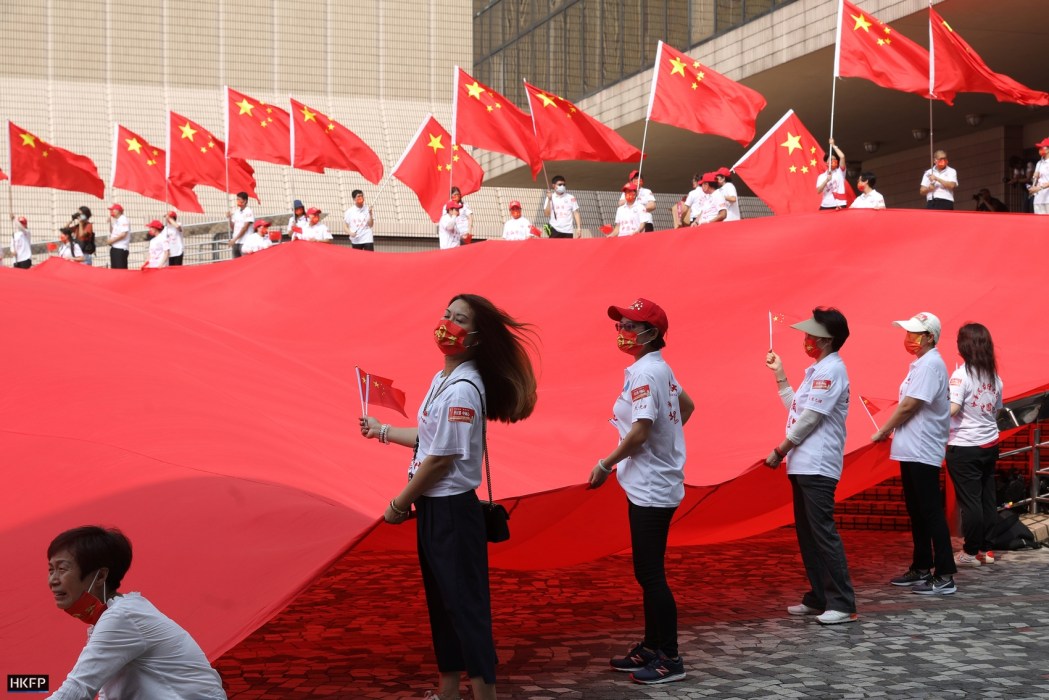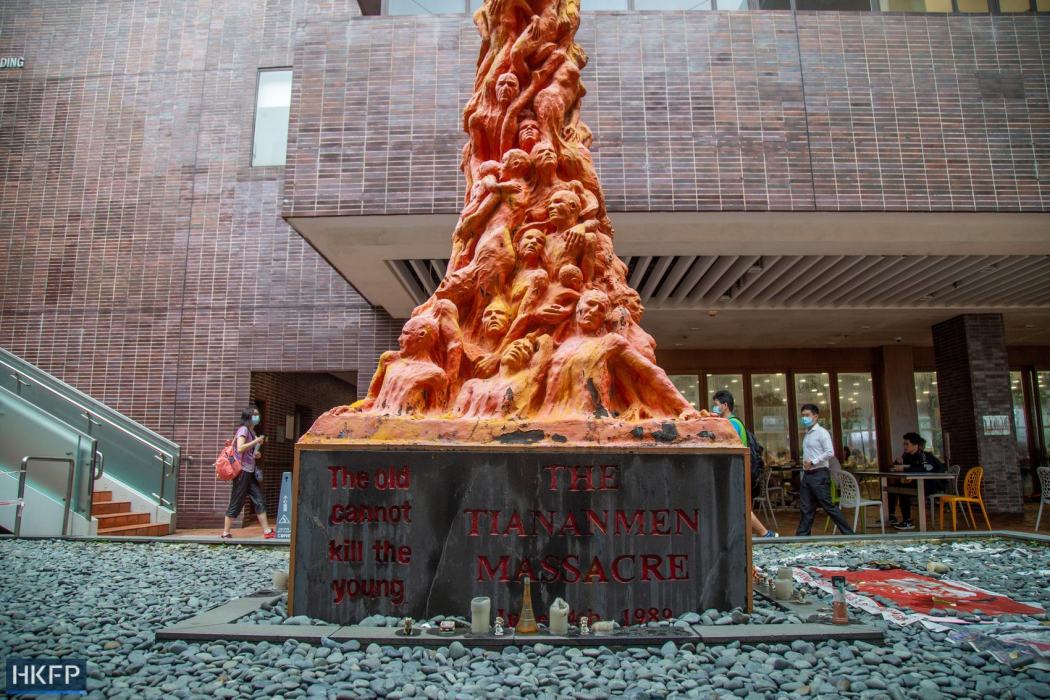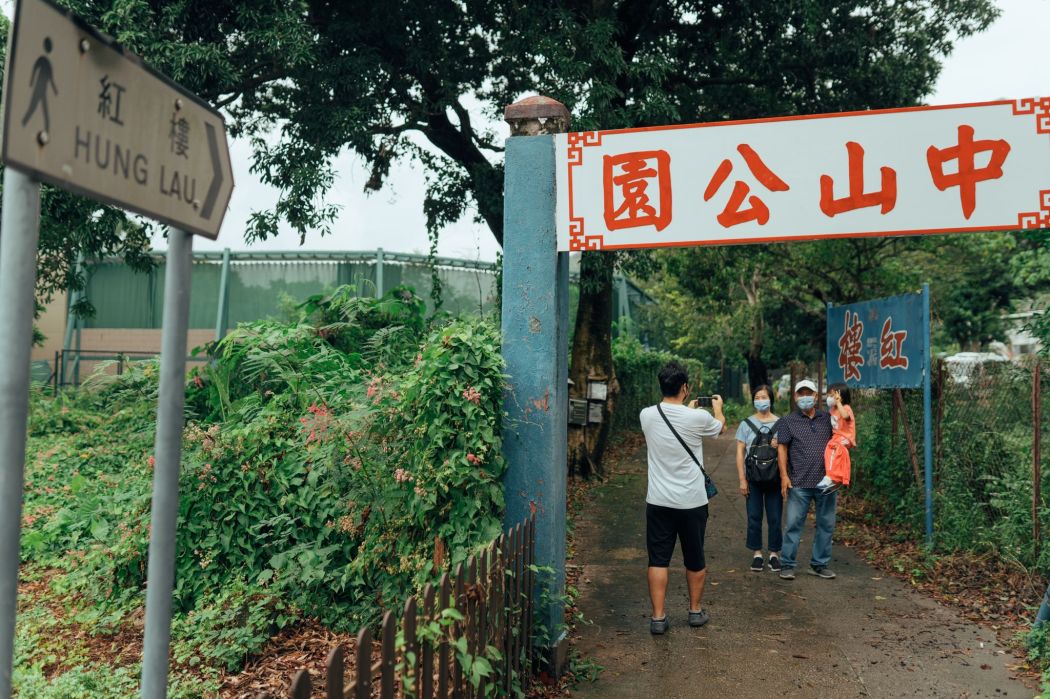October began with a sea of red Chinese flags around Tsim Sha Tsui’s harbourfront as patriots celebrated China’s national day. But the security law clampdown continued and – within the month – a university student union folded and an international rights group announced it would close its offices in the city. Meanwhile, a monument to victims of the 1989 Tiananmen Massacre may soon be removed, whilst a new law involving the use of flags came into effect, alongside film censorship and doxxing legislation.
Since the law’s enactment on June 30, 2020, 155 people have been arrested under it and 100 of them have been charged. Authorities have declined to say how many security law investigations are under way. Recent arrests have prompted UN rights experts to urge a review of the legislation, slamming it as “incompatible” with international law.

HKFP continues its monthly series of explainers on how authorities are transforming Hong Kong in the name of protecting China’s national security.
Independent media barred from Nat. Day event
An event to celebrate China’s National Day organised by the city’s local pro-Beijing media sector shunned two independent online media outlets. Reporters from Stand News and Citizen News were barred from attending the reception on the grounds that they weren’t invited. The event was organised by management from public broadcaster RTHK, the Beijing-backed Ta Kung Wen Wei Media Group, the Hong Kong Economic Times, and Chinese state-run newswire Xinhua.
Pillar of Shame
The following week, the University of Hong Kong demanded that the now-disbanded group which organised the vigil commemorating the 1989 Tiananmen Massacre remove a monument honouring victims from its campus, where it has stood for the past 24 years.
The statue’s days in the city were thought to be numbered after the police national security crackdown on the group, the Hong Kong Alliance in Support of Patriotic Democratic Movements of China.

The statue’s creator Danish artist Jens Galschiøt has since asserted his ownership rights to the artwork known as the Pillar of Shame, launching an international campaign to save the piece and arrange for it to be relocated abroad.
The move has prompted an expert to decry a “political purge” on Hong Kong’s university campuses.
The university’s legal representative, Chicago-founded law firm Mayer Brown, withdrew from the statue case following a week of strong international pressure from rights groups. In response to the decision, former chief executive Leung Chun-ying called for a China-wide boycott of the law firm, accusing it of bowing to foreign interference.
The monument still stands at the Pok Fu Lam campus and the university has said it will deal with the issue in a “legal and reasonable manner.”
Int’l rights group pulls out of city
Amnesty International announced it would close its offices in Hong Kong by the end of the year, citing increasing uncertainty and the difficulty of operating under the security law. The Southeast Asia and Pacific Regional office will move elsewhere in the region, while Amnesty’s local office will cease operations.
Leader Carrie Lam, however, has claimed that there was “no way to prove” the group had left out of security law concerns, maintaining that the legislation protected fundamental human rights and freedoms.
Marathon runners
Runners at the Standard Chartered marathon were told by police to cover up tattoos and remove pieces of clothing that displayed the message “Add oil (Keep it up) Hong Kong,” a popular chant during the 2019 protests and long before then. Authorities claimed the presence of the phrase constituted “political attire.”

Standard Chartered, the chief sponsor, declined to comment on whether it supported free speech following the event.
Student union folds
Political pressure is also being increasingly felt on other university campuses. The student union at the Chinese University of Hong Kong dissolved, citing increasing difficulties in operations after the university cut ties with it earlier this year. The union had been in operation for 50 years.
A former union leader warned that the role of students in the city will “only be further diminished” following its dissolution.
Taiwan national day celebrations ‘subversive’
Security personnel barred access to Tuen Mun’s historic “Red House,” where the founder of modern China Sun Yat-sen is believed to have stayed as he plotted some dozen revolutionary attempts against the imperial Qing Dynasty. The aim was to prevent any public commemorations of Taiwan’s national holiday.

In the days leading up to what is known as “Double Ten Day,” rumours swirled that those found celebrating the day would be arrested, after the city’s security chief warned celebrations may be viewed as supporting Taiwan Independence – an act of subversion under the security law.
Second trial under security law
Ma Chun-man, the second person to be tried under the security law, was convicted of “inciting secession” by the District Court for chanting and posting pro-Hong Kong independence slogans on social media on at least 20 separate occasions last year. He is due to be sentenced in mid-November.
Schools to implement weekly Chinese flag-raising ceremonies
The Education Bureau has ordered all local schools, including kindergartens, to fly the Chinese national flag and hold weekly flag-raising ceremonies to instil a sense of patriotism and love for the country among children and young people.

Teachers will undergo more testing on their knowledge of the Basic Law, while their social media posts will also be monitored.
Laws to be bolstered against security threats
Hong Kong passed a controversial law allowing censors to ban films seen as contrary to China’s national security. Penalties include fines of up to HK$1 million and three years’ imprisonment. A new new anti-doxxing law was passed – violators face a HK$1 million fine and five years jail. Plus, it became illegal to insult the Chinese flag on the internet, with offenders also facing years in prison.
More local laws will be revised to better target national security threats, leader Carrie Lam announced during the last policy address of her term.

Meanwhile, a local version of the national security law — to be introduced under Article 23 of the Basic Law — will criminalise more offences seen as national security crimes, including espionage and stealing state secrets.
Plans to ban convicted social workers
The government is mulling plans to ban social workers convicted of national security offences from the profession. Many social workers were on the frontlines of the 2019 pro-democracy protests in what they said were efforts to ease tensions between police and protesters.
Support HKFP | Policies & Ethics | Error/typo? | Contact Us | Newsletter | Transparency & Annual Report | Apps
Help safeguard press freedom & keep HKFP free for all readers by supporting our team
























